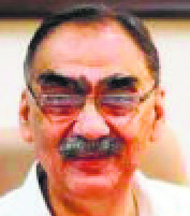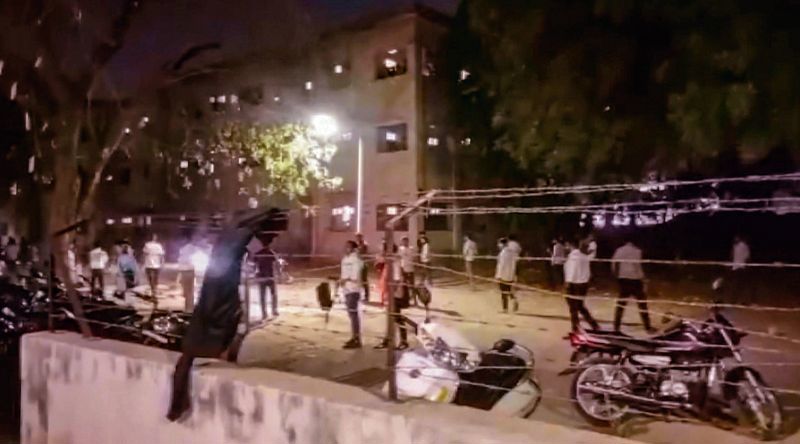Gujarat University incident turns the spotlight on the safety of foreign students
“Academic institutions with foreign students have to be especially vigilant that the inevitable tensions between them, if they are in sizeable numbers, and local students are kept in check. The ICCR too must act with greater concern on this issue too. The organization’s task is to project Indian culture abroad and showcase the richness of its tolerant traditions. The ruling dispensation has been eager to portray India as the mother of democracy. It is essential to show that there is no discrimination on the grounds of faith or race against anyone in India. It is only then that the message of India’s democratic traditions and its oft-quoted motto — Vasudhaiva Kutumbakam — would carry credibility with foreign students.”

The five foreign students who were injured in a mob attack on their hostel on March 16 were, according to media reports, Indian Council of Cultural Relations (ICCR) scholarship holders. They were Muslims, including some from neighboring countries, and were offering namaz. The assailants objected to their doing it on the hostel premises and asked them to go to a mosque. Hot words were exchanged and the mob not only attacked the students but also ransacked their rooms and damaged some of their vehicles. Two of the injured students had to be hospitalized.
Such incidents can prompt nations and groups inimical to this country to intensify their anti-India campaign.
On March 17, a spokesperson for the Ministry of External Affairs (MEA) took to social media platform X (formerly Twitter). He said: “An incident of violence took place at Gujarat University in Ahmedabad yesterday. The state government is taking strict action against the perpetrators. Two foreign students were injured. One of them has been discharged from the hospital after receiving medical attention. The MEA is in touch with the Gujarat Government.”
Clearly, the MEA was unwilling to refer to the ‘perpetrators’ even though visuals of the incident and comments of foreign students in the hostel concerned were being circulated on social media. This unnecessary caution would hardly fulfil the ICCR’s objective that the scholarships are “an important vehicle of outreach and create goodwill about India…” and that “each ICCR scholar is India’s goodwill ambassador abroad”. It is doubtful if many of the 300 ICCR scholarship holders studying at Gujarat University would subscribe to these aims of the ICCR after this incident. It is noteworthy that there are around 7,000 ICCR scholars in India. According to the media, of these, 1,100 are in Gujarat, including those at Gujarat University.
The Vice-Chancellor of the university, Neerja Gupta, visited the hostel almost 12 hours after the attack. Perhaps she was advised by the police and the university administration not to be there immediately after the night-time incident. It is not known if any senior faculty or administration members arrived to give an assurance of safety to the foreign students. Gupta has now formed a Foreign Student Advisory Committee. She has stated that namaz was not the main issue and that there was a need for foreign students to become culturally oriented. She needs to clarify if it was wrong on the part of the foreign students to offer namaz in their hostel. She would no doubt be aware that Muslims all over the world become more conscious of their religious obligations during the month of Ramzan, which began in India last week. It is also pertinent to ask whether foreign Muslim students offered namaz in their hostels in previous years or was this the first time that they did so.
The Gujarat Police have apprehended five perpetrators and formed teams to nab others. There is an urgent need to investigate the case thoroughly and take action against the guilty so that nations and groups inimical to this country do not spread the message that India is no longer safe for foreign Muslim students. Anti-India forces are busy spreading the word that India is in the grip of Islamophobia. Such incidents and the ambivalent comments such as those of the V-C and the MEA can be used by these parties to intensify their anti-India campaign.
In the context of this incident, it is necessary to mention that India once again abstained from supporting a resolution in the United Nations General Assembly (UNGA) on Islamophobia, moved by Pakistan and other Islamic countries. This resolution was adopted on the UNGA-designated day against Islamophobia last year. India had abstained because it felt that no religion should be singled out and the UNGA should adopt a resolution against phobias pertaining to any religion. The current resolution built on the one adopted last year and asked the UN Secretary General to appoint a special envoy to combat Islamophobia. India explained its abstention on the same lines as last year.
There can be no quarrel with the Indian argument that the world should not be divided into religious camps, but the fact is that India’s abstention may be co-related with the Gujarat University incident; hence, there is a need for greater efforts in this matter by all concerned — MEA, ICCR, the Gujarat University authorities and the law enforcement agencies of Gujarat. India has interests in the Islamic world and it should not allow the feeling to spread that it is difficult for Muslims in India or those from abroad to observe their religious obligations in the country.
Academic institutions with foreign students have to be especially vigilant that the inevitable tensions between them, if they are in sizeable numbers, and local students are kept in check. The ICCR too must act with greater concern on this issue too. The organization’s task is to project Indian culture abroad and showcase the richness of its tolerant traditions. The ruling dispensation has been eager to portray India as the mother of democracy. It is essential to show that there is no discrimination on the grounds of faith or race against anyone in India. It is only then that the message of India’s democratic traditions and its oft-quoted motto — Vasudhaiva Kutumbakam — would carry credibility with foreign students.
The Indian government puts great emphasis on the country’s soft power. India especially stresses that if the world were to follow the principles of harmony and peace which evolved in India in ancient times, it would become a better place. Certainly, the mob attack on foreign students offering namaz in a university was not in keeping with the soft power which India seeks to project.
What is noteworthy is that political leaders have generally avoided commenting on the matter, even as Kerala Governor Arif Mohammed Khan said such incidents indicated that people of the country were still not fully aware of its traditions and cultural heritage. What does that say about our polity and society?
(The author is a former Secretary, Ministry of External Affairs, Government of India)
